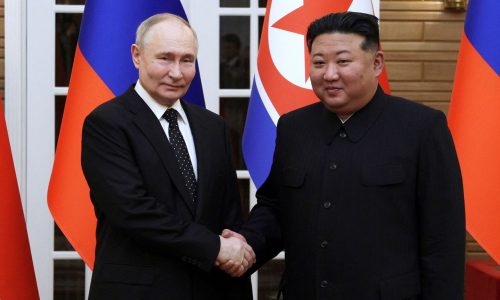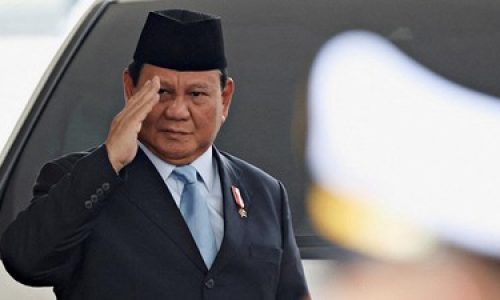By: Beni Sukadis, Military analyst at the Indonesian Institute of Defense and Strategic Studies (LESPERSSI) based in Jakarta
An Israeli missile hit Iran on April 19, 2024, with blasts heard in the central province of Isfahan, although it is unclear what the target is.
Iran is on high alert after Israel said it would respond to an Iranian attack. On Saturday, April 13, 2024, the Iranian military (IRGC) attacked several Israeli military bases with hundreds of drones, cruise missiles and ballistic missiles from Iran and Yemen. The Iranian attacks targeted in particular the Israeli air base at Nevatim and the base at Mount Hermon. The world was shocked by the Iranian attacks, but no Israeli civilian or soldier casualties were reported.
The recent escalation of tensions between Iran and Israel has called into question the U.S.’s longstanding foreign policy of unconditional support for Israel. The Iranian Islamic Revolutionary Guard Corps (IRGC) justified the attack and attributed it to Operation True Promise, which was launched in retaliation for what they perceived as Israeli crimes targeting the Iranian Embassy in Syria on April 1, 2024. The attack resulted in the deaths of 12 people, including two senior generals from the IRGC’s elite Quds Force. Israel has neither confirmed nor denied its responsibility for the Embassy attack, so the situation remains shrouded in doubt.
This escalation follows months of conflict in the Middle East, particularly Israel’s offensive in the Gaza Strip, which has resulted in heavy casualties on the Palestinian side and heightened regional tensions. Israel’s offensive in Gaza has killed more than 30,000 women and children as a result of the Prime Minister Benjamin Netanyahu government’s target to eliminate the Hamas organization and free citizens captured in Hamas attacks in October last year.
Hassan Barari, an expert from Qatar University, argued that while Iran’s attack is an escalation of the conflict, it is also a calculated and measured move. He said that Iran’s statement to the UN, which indicated that the attack “ended” the matter, showed a desire to avoid further retaliation from Israel and to regain respectability without appearing weak in the eyes of its proxies. However, the impact of this attack on Israel’s ongoing conflict in Gaza remains uncertain, depending on Israel’s interpretation of the situation.
U.S. President Joe Biden condemned the Iranian attack and promised coordinated diplomatic steps with G7 allies. Although the United States reaffirmed its strong support for Israel’s security in a phone conversation with Prime Minister Benjamin Netanyahu, the Biden administration’s response reflected a delicate balancing act between supporting Israel and easing tensions in the region.
The special relationship between the U.S. and Israel over the decades is reflected in Prime Minister Benjamin Netanyahu’s speech before the US Congress in 1996 as well as subsequent statements by other Israeli leaders. At the time, Netanyahu recognized the enormous support the United States provided to Israel, emphasizing not only political and military aid but also significant economic assistance. He described this support as “great and extraordinary,” underlining the depth of the relationship between the two countries. Moreover, data from 2005 showed that US economic and military aid to Israel totalled $154 billion.
This large amount of aid underscores the important role the United States has played in strengthening Israel’s security and economic development over the years. This level of support reflects the long-term partnership and strategic alliance between the two countries.
As tensions rise and the conflict continues, the dynamics of US support for Israel have come under scrutiny, prompting calls for re-evaluation into the long-standing unconditional aid policy.
John Mearsheimer, a leading US political scientist, argues in his landmark book, The Israel Lobby and the US Foreign Policy (2007), that the Israel lobby significantly shapes U.S. foreign policy in the Middle East. While recognizing that the Israel lobby is not the sole arbiter of U.S. decisions in the region, Mearsheimer argues that the lobby has considerable influence, particularly in matters relating to Israel.
Mearsheimer argues that while not very powerful, the lobby effectively steers U.S. policy that often favors Israeli interests, but often at the expense of broader American interests. Furthermore, Mearsheimer highlights the complexity of the U.S.-Israel relationship and the interplay between domestic lobbying efforts and U.S. foreign policy decision-making.
While the Israel lobby may favor policies that it deems best for Israel, Mearsheimer warns that these policies may ultimately harm U.S. and Israeli interests. This perspective certainly adds critical questions to the long-standing U.S. policy of unconditional support for Israel, raising questions about the policy’s alignment with broader strategic goals and its consequences for regional stability.
Moreover, the U.S.’ unwavering support for Israel may have a greater impact than expected, especially compared to what some perceive as a less serious response to the suffering experienced by the Palestinian population in Gaza. Israel’s nearly seven-month invasion of Gaza has resulted in massive destruction and loss of life, with an estimated 30,000 civilians killed. This brutal aggression has drawn condemnation from many governments, international organizations and individuals around the world, calling Israel’s actions as excessive and disproportionate.
It is widely perceived that the United States applies double standards in its approach to the Palestinian-Israeli conflict, particularly from the Islamic world. Over time, the U.S.’s reluctance to intervene impartially in the issue, which often favors its ally Israel, ultimately risks damaging its reputation as a champion of humanitarian values. This disparity in treatment could ultimately undermine the United States’ position as the global standard-bearer for principles such as justice, fairness and respect for human rights.
In recent times, the United States has frequently used its veto power at the UN Security Council to block resolutions criticizing Israel’s military operations in Gaza. This stance has led to increasing global disenchantment with U.S. foreign policy in the region, as many perceive it to favor Israeli interests over humanitarian interests and international law. As a result, global sympathy and support has increasingly shifted to the Palestinian people who have long suffered systematic oppression and violence by the Israeli military.
The gap between U.S. support for Israel and its response to Palestinian suffering underscores the complex moral and geopolitical considerations at play in the Middle East. While the U.S.-Israel alliance remains a cornerstone of American foreign policy, the costs of this partnership and its implications for regional stability continue to fuel debate. As the conflict continues and casualties mount, the United States faces growing pressure from the international community to reassess its approach and prioritise efforts to achieve a just and sustainable resolution for all parties involved.
Impact on Indonesia
The impact of the conflict between Iran and Israel on the Indonesian economy includes rising prices of imported food commodities such as rice, wheat, corn, and soya, as well as the obstruction of corn supply, which could result in higher prices of animal feed and animal protein.
As a net oil importer, Indonesia will be directly impacted by rising world oil prices, which could potentially increase domestic oil prices. In addition, rising import and export transport costs will also impact the supply and cost of manufacturing industries, potentially resulting in higher prices of manufactured products.









